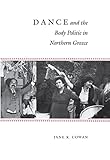Dance and the Body Politic in Northern Greece / Jane K. Cowan.
Material type: TextSeries: Princeton Modern Greek Studies ; 36Publisher: Princeton, NJ : Princeton University Press, [2016]Copyright date: ©1991Description: 1 online resource (310 p.)Content type:
TextSeries: Princeton Modern Greek Studies ; 36Publisher: Princeton, NJ : Princeton University Press, [2016]Copyright date: ©1991Description: 1 online resource (310 p.)Content type: - 9780691028545
- 9781400884377
- 792.8/09495 20
- GV1588.6 .C69 1990eb
- online - DeGruyter
- Issued also in print.
| Item type | Current library | Call number | URL | Status | Notes | Barcode | |
|---|---|---|---|---|---|---|---|
 eBook
eBook
|
Biblioteca "Angelicum" Pont. Univ. S.Tommaso d'Aquino Nuvola online | online - DeGruyter (Browse shelf(Opens below)) | Online access | Not for loan (Accesso limitato) | Accesso per gli utenti autorizzati / Access for authorized users | (dgr)9781400884377 |
Browsing Biblioteca "Angelicum" Pont. Univ. S.Tommaso d'Aquino shelves, Shelving location: Nuvola online Close shelf browser (Hides shelf browser)

|

|

|

|

|

|

|
||
| online - DeGruyter Village Atheists : How America's Unbelievers Made Their Way in a Godly Nation / | online - DeGruyter Notes from the Balkans : Locating Marginality and Ambiguity on the Greek-Albanian Border / | online - DeGruyter Firewalking and Religious Healing : The Anastenaria of Greece and the American Firewalking Movement / | online - DeGruyter Dance and the Body Politic in Northern Greece / | online - DeGruyter Contested Identities : Gender and Kinship in Modern Greece / | online - DeGruyter Demons and the Devil : Moral Imagination in Modern Greek Culture / | online - DeGruyter The Fourth Dimension / |
Frontmatter -- Contents -- List of Illustrations -- Preface -- Introduction -- Chapter One. Place, Distinctions, Identities -- Chapter Two. Gender, Household, and Community -- Chapter Three. Everyday Sociability as Gendered Practice -- Chapter Four. Dancing Signs: Deciphering the Body in Wedding Celebrations -- Chapter Five. The Orchestration of Association in Formal Evening Dances -- Chapter Six. Male Prestige and the Eruption of Conflict -- Chapter Seven. Ambivalent Pleasures: Dance as a Problem for Women -- Chapter Eight. Aphrodite's Tables: Breakdown, Blame, and Female Sexuality -- Chapter Nine. Because of the Dance -- Works Cited -- Index -- Backmatter
restricted access online access with authorization star
http://purl.org/coar/access_right/c_16ec
Valued for their sensual and social intensity, Greek dance-events are often also problematical for participants, giving rise to struggles over position, prestige, and reputation. Here Jane Cowan explores how the politics of gender is articulated through the body at these culturally central, yet until now ethnographically neglected, celebrations in a class-divided northern Greek town. Portraying the dance-event as both a highly structured and dynamic social arena, she approaches the human body not only as a sign to be deciphered but as a site of experience and an agent of practice. In describing the multiple ideologies of person, gender, and community that townspeople embody and explore as they dance, Cowan presents three different settings: the traditional wedding procession, the "Europeanized" formal evening dance of local civic associations, and the private party. She examines the practices of eating, drinking, talking, gifting, and dancing, and the verbal discourse through which celebrants make sense of each other's actions. Paying particular attention to points of tension and moments of misunderstanding, she analyzes in what ways these social situations pose different problems for men and women.
Issued also in print.
Mode of access: Internet via World Wide Web.
In English.
Description based on online resource; title from PDF title page (publisher's Web site, viewed 30. Aug 2021)


